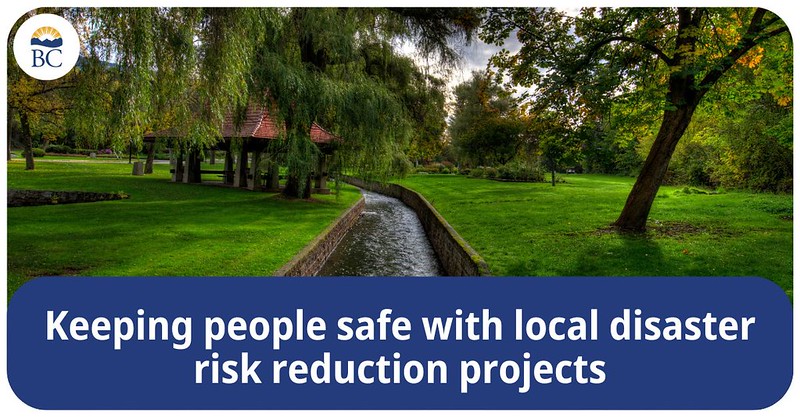March 21, 2024 – More communities will benefit from local projects that help keep people safe during disasters and extreme-weather events.
A new B.C. Flood Strategy will also build flood preparedness throughout the province.
“The climate crisis is here and we need communities to adapt and strengthen their defences against flooding and other extreme-weather events,” said Bowinn Ma, Minister of Emergency Management and Climate Readiness. “We are working with local governments and First Nations to reduce disaster risk and better prepare people and communities for the impacts of climate change.”
The Province is investing approximately $39 million for more than 50 local disaster-risk reduction and climate-adaptation projects through the Community Emergency Preparedness Fund (CEPF). This funding will be used by local governments and First Nations to make necessary changes, such as small-scale structural flood projects and improvements to community flood-mitigation strategies, including more accurate flood mapping.
While taking immediate steps to support communities and keep people safe, the Province is also launching a new comprehensive B.C. Flood Strategy that will guide continued flood preparedness and mitigation work by all orders of government from now until 2035. The strategy will support communities to better prepare for flood impacts and strengthen their ability to respond to flood crises.
“After decades of piecemeal approaches to flood management, we have worked with communities to develop B.C.’s first integrated vision for provincial flood preparedness so we can keep people safe,” said Nathan Cullen, Minister of Water, Land and Resource Stewardship. “The new B.C. Flood Strategy will guide our continued work with First Nations, local government agencies, the agricultural sector, industry and conservation organizations, as we take actions to reduce flood risk. Together, we can build stronger communities that are resilient to flood hazards in a changing climate.”
Projects funded across B.C. through the CEPF include:
- a dike rehabilitation project, including temporary emergency flood-protection equipment in low-lying areas and a nature-based flood-protection assessment to enhance the natural environment and protect shorelines to keep everyone in Richmond safer from flooding;
- keeping people safe from potential flooding and mitigating damage to salmon-spawning grounds through decommissioning and repairs to the Holland Creek weirs in Ladysmith;
- reinforcement and repairs to the East and West Munday Creek slopes damaged during the 2021 atmospheric river to protect people and nearby homes, as well as slope stabilization and creek floodplain mapping in Langley Township;
- reinforcing a drainage-pump system and raising and widening the Latimer Creek dike in the Serpentine River in Surrey to safeguard important transportation corridors and agricultural lands, and provide protection against a flood that has a chance of happening once in 200 years;
- the Carnegie and Kensington community centres in Vancouver will be upgraded to operate as safe centres for vulnerable people during extreme weather, including heat, and poor air-quality events, while existing mechanical equipment will be replaced with heat-pump systems that provide cooling capabilities, increased air filtration to improve indoor air quality and use less energy to reduce greenhouse gas emissions; and
- increasing the knowledge and capacity of riparian, or the area between land and water, and watershed health, and restoring two sites to kickstart a larger watershed restoration project, significantly reducing the loss of land and sediment, which impacts downstream communities and water systems, and improves conditions during flood and drought events in the Regional District of Kootenay Boundary.
The CEPF helps communities to better prepare for and mitigate the impacts of climate-related emergencies by funding local projects and initiatives in several categories. In addition to the Disaster Risk Reduction – Climate Adaptation stream, other categories include public notification and evacuation-route planning, Indigenous cultural safety and cultural humility training, and emergency-support services equipment and training. The CEPF is administered by the Union of BC Municipalities on behalf of the Province.
The Province has invested $369 million into the CEPF since it was established in 2017. Approximately $214 million has been provided to First Nations and local governments through the CEPF for more than 1,880 projects. This includes approximately $115 million to support disaster-mitigation and climate-adaptation projects.
Learn More:
To find out more about the B.C. Flood Strategy, visit: https://www2.gov.bc.ca/gov/content/environment/air-land-water/water/drought-flooding-dikes-dams/integrated-flood-hazard-management/bc-flood-strategy
For more information about the Community Emergency Preparedness Fund, visit: https://www.ubcm.ca/funding-programs/local-government-program-services/community-emergency-preparedness-fund
Port Moody – C1, C2: Coastal flood-management strategy
Approved amount: $300,000
